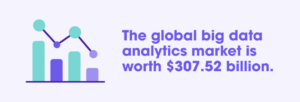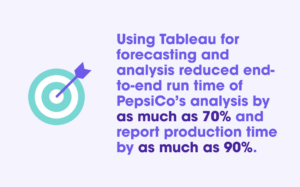
Hiring a Data Analyst? What to Look for in Top Candidates Now
Hiring the right data analyst is crucial for your business. It’s like having a skilled navigator on your journey—it helps you steer your ship through the vast ocean of information. From enhancing marketing strategies to predicting market trends and even advancing healthcare, data analysis plays a central role in decision-making across various sectors.
But what qualities does a data analyst need to possess? That’s exactly what we’re going to find out in this guide.
The growing importance of data analysisData analysis isn’t just an optional tool; it’s become a cornerstone of modern operations.
The global big data analytics market is worth $307.52 billion and is projected to hit $745.15 billion by 2030—a 13.5% CAGR. But why is data so crucial?

Data from Fortune Business Insights
Similar to having a trustworthy GPS system, data directs enterprises toward their objectives. Analytics does this by revealing trends and vital information that allow businesses to make important short and long-term decisions.
This is why hiring the right person for your data analytics role is so important.
The impact of hiring the right data analystThink of hiring the right data analyst as selecting an experienced captain for your expedition. The captain should be capable of providing solutions when you need them the most.
For instance, in times of crisis, such as tech layoffs, hiring the right data analyst who aligns with your company’s values is crucial. The analyst will help you determine how the proposed layoffs may affect the organization’s productivity and morale.
Here are four key benefits of hiring the right data analyst:
- Improved Decision-Making: A competent data analyst lowers your risk of making ill-informed decisions by offering insightful data analysis.
- Enhanced Efficiency: They are able to streamline procedures and spot opportunities for improvement, ultimately saving time and money.
- Competitive Advantage: With the right data analyst, your organization can gain a competitive edge by staying ahead of market trends and customer preferences.
- Innovation: Data analysts can find opportunities and patterns that are hidden and lead to new ideas within your company.
Related: Recruiting Software Platforms: What You Need to Know
The essential qualities of a data analyst: Technical skillsThere are four main areas to concentrate on when it comes to the technical side of being a data analyst. These skills are the nuts and bolts that allow your data analyst to navigate the data landscape effectively.
1. Working knowledge of data analysis tools
Your data analyst should be well-versed in using software and tools specifically designed for data analysis. For instance, your company could be using a Vonage VoIP for small business system that generates a wealth of data on call volumes, call durations, and customer interactions.
Familiarity with tools like Excel, Python, R, or specialized software like Tableau is essential to uncovering insights. These insights can go on to drive significant positive results for your business. For example, by adopting Tableau, PepsiCo was able to reduce the time it takes to produce reports by up to 90%.
Related: Hired’s 2023 State of Tech Salaries report

Data from Tableau
Data analysis tools help in cleaning, processing, and transforming raw data into meaningful insights. For instance, when dealing with sales data, proficiency in tools like Excel can help identify trends and patterns in revenue generation.
2. Programming skills
Programming skills are the coding language that data speaks. A competent data analyst should have a working knowledge of programming languages like Python or R. They can perform sophisticated data manipulation and statistical analysis thanks to these languages.
For instance, when analyzing customer data for an e-commerce business, programming skills enable the automation of repetitive tasks, such as calculating purchase trends.
3. Database management
Databases are like the library of your organization’s data. Data analysts need to be adept at managing and querying data from various databases. Knowledge of SQL (Structured Query Language) is invaluable here, as it helps retrieve specific data from large datasets efficiently.
For example, when working with customer databases, a data analyst may use SQL to extract information about customer demographics and preferences.
4. Data visualization expertise
Data visualization is the art of turning numbers and statistics into visually appealing and understandable graphics. A proficient data analyst should be skilled in creating charts, graphs, and interactive dashboards.
Tools like Tableau, Power BI, or even Python libraries like Matplotlib and Seaborn come in handy here. When presenting quarterly sales reports to a team, data visualization expertise makes it easier for everyone to grasp the key insights at a glance.
Note that recruitment tech like applicant tracking systems (ATS) can efficiently source and filter candidates based on specific criteria, including data visualization expertise. These systems can help you find data analysts with relevant skills and experience in this specific area, allowing you to narrow down your pool of candidates to the best ones.
The essential qualities of a data analyst: Soft skillsSoft skills are the intangible qualities that make a data analyst not just effective but exceptional. They enable the analyst to navigate the human and organizational aspects of data analysis, making a real impact.
1. Teamwork
Because they frequently work in groups, it’s essential for data analysts to have strong collaboration skills. For instance, your marketing team may need to launch a retargeting strategy for e-commerce.
Such a strategy would require insights into audience segmentation, ad performance, and customer behavior patterns, which data analysts can provide. A data analyst with poor teamwork skills would hamper the success of the retargeting campaign.
2. Adaptability
Analysts need to stay current with the continuously changing data landscape. Adaptability ensures that analysts can thrive in a dynamic environment. For instance, when working on a project where the data source suddenly changes, an adaptable data analyst can quickly adjust their approach to maintain data integrity.
3. Communication skills
Free to use image sourced from Unsplash
Imagine having an excellent idea but being unable to communicate it; you won’t get very far. Data analysts need to communicate their findings effectively, both to technical and non-technical stakeholders.
They should be able to translate complex data into plain language and compelling visuals. This skill is crucial when presenting market insights to a group of executives or explaining data-driven recommendations to a customer.
4. Analytical skills
When it comes to finding hidden patterns and insights inside data, a data analyst needs to be a skilled investigator. They ought to be adept at analyzing intricate data sets, identifying patterns, and coming to insightful conclusions.
Consider a scenario where a company has implemented call center cloud solutions to handle customer inquiries and complaints. Without skilled data analysts, the wealth of data generated by these interactions remains untapped.
5. Problem-solving abilities
Data analysis often involves resolving complex issues. Your data analyst should have a knack for approaching problems methodically. They should be able to break down large, intricate challenges into smaller, manageable parts.
When a retail company, for instance, has to determine why its sales have declined in a particular area and how to reverse the trend, this quality is vital.
6. Attention to detail
Data analysts should be meticulous in data collection, cleaning, and analysis to ensure accuracy. When, for instance, a financial institution is auditing transactions, attention to detail is essential to spot anomalies that could indicate fraudulent activities.
Other important factors to consider when hiring a data analystWhen searching for the right data analyst, their experience and specialization are vital aspects to consider. These factors ensure they can effectively navigate the specific challenges your organization faces.
1. Years of experience
While years of experience alone aren’t the only indicator of a great data analyst, they do matter.
More experienced analysts often possess a better understanding of cutting-edge methods and proven problem-solving abilities.
For instance, when dealing with historical market data, an analyst with several years of experience may have insights into market cycles that a less experienced analyst might miss.
2. Industry specialization
An analyst with industry specialization has an in-depth understanding of specific sectors. For example, a call center utilizing auto-dialing software will benefit from hiring a data analyst with experience in the call center industry.
Such an analyst would be skilled at identifying specific call dispositions that lead to successful outcomes and recommending strategies for tailoring auto-dialing scripts to maximize results.
3. Project portfolio
Think of a data analyst’s project portfolio as their resume in action. It’s a collection of past projects they’ve tackled, showcasing their ability to deliver results.
For instance, a data analyst’s portfolio might include projects where they improved supply chain efficiency, optimized marketing campaigns, identified cost-saving opportunities, or analyzed the traffic of an OnlyDomains website. By looking at their portfolio, you’ll be able to better gauge whether their past expertise is a good fit for your company.
Hiring a data analyst with confidenceWith the ever-increasing prominence of big data, working with a skilled data analyst is paramount for businesses across all sectors.
A well-rounded data analyst should demonstrate a special mix of abilities, knowledge, and experience. Use the tips listed above to make the right choice when hiring tech talent for your business.
Remember that recruiting the right data analyst is more than just filling a job vacancy; they are a calculated investment in your success in the future.
Related blog posts

Too Many Inbound Job Applicants But Not Enough Qualified Ones? 8 Tactics to Solve It
As a recruiter, talent acquisition specialist, or hiring manager, you may have experienced an...

How Many Candidates Should You Interview for a Job? Hiring Best Practices
A lot of hiring managers ask, “How many candidates should you interview for a job?” What the...

Re-engineering Your 2023 Tech Hiring Strategy (Watch VIDEO on Demand)
If you are in the market to hire qualified software engineers, you need to modify your 2023...

5 Key Elements of a Solid Compensation Philosophy
What is a compensation philosophy? A compensation philosophy is the foundation on which...

Top 3 Strategies to Nurture Your Tech & Sales Candidate Pipeline
In the wake of the economic downturn and slow labor market, companies are focusing on talent...

First 3 Questions to Ask Tech Talent (& What to Listen For)
About this Infographic Make the most of technical phone screens by starting off strong...

